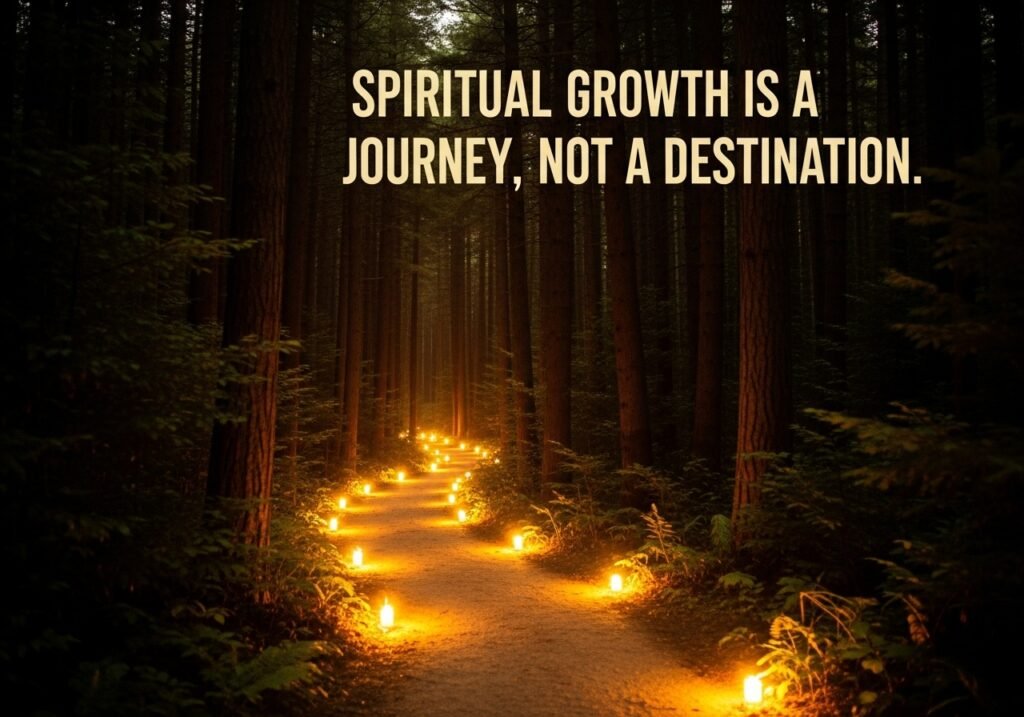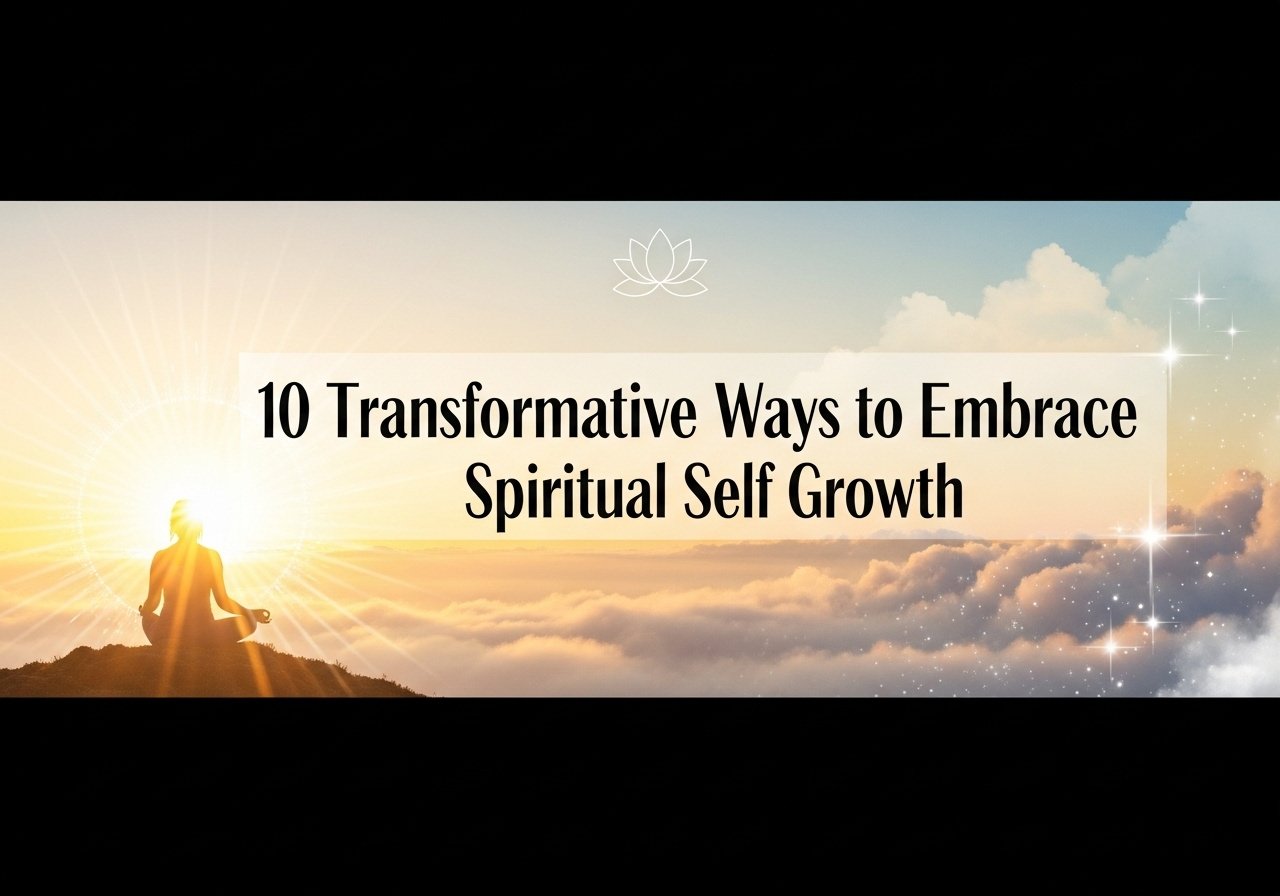Introduction
Spiritual self growth is not a destination, it’s a lifelong journey of aligning your inner self with deeper truths, values, and universal wisdom. Unlike material accomplishments, spiritual growth transforms the way you think, feel, and act in the world. It opens the door to peace, resilience, compassion, and authenticity.
In today’s fast-paced and distracted world, more people are seeking tools and practices that help them connect with something greater than themselves. Whether it’s through meditation, mindfulness, or serving others, spiritual self growth provides a foundation to rise above challenges and lead a purposeful life.
Below are 10 transformative ways to nurture your spiritual self growth and create lasting changes from the inside out.
Cultivate Daily Mindfulness
Mindfulness is the art of living in the present moment with awareness and acceptance. Instead of letting your mind wander into the past or worry about the future, mindfulness anchors you to the now. By practicing mindfulness daily—whether during meals, walks, or conversations—you strengthen your spiritual awareness.
Spiritual self growth thrives when you pay attention to life as it unfolds, no matter how small or ordinary the moment may seem. Over time, mindfulness helps reduce stress, enhances gratitude, and deepens your connection with your inner self.

Meditate for Inner Clarity
Meditation is one of the most powerful tools for spiritual expansion. It quiets the noise of your mind and creates space for clarity, peace, and insight. Even 10–15 minutes of meditation each day can improve focus, reduce negative emotions, and help you tune into your spiritual essence.
Meditation doesn’t have to be complicated—you can start with guided meditations, focus on your breath, or repeat positive affirmations. The consistency of practice matters more than the length. Over time, meditation nurtures patience, compassion, and wisdom—all crucial for spiritual self growth.

Practice Gratitude Journaling
Gratitude is a cornerstone of spiritual development. When you consciously appreciate the blessings in your life, you shift your energy toward abundance and positivity. Keeping a gratitude journal, where you write down three to five things you’re thankful for each day, rewires your brain to focus on the good.
This simple practice fosters humility and helps you see life’s challenges as opportunities for growth. Gratitude aligns your heart with love and kindness, amplifying your spiritual journey.

Connect with Nature
Spending time in nature is one of the most grounding ways to nurture your spiritual self growth. The stillness of a forest, the rhythm of ocean waves, or the vastness of the sky remind you of your place in the larger universe.
Nature has a unique ability to heal, inspire awe, and dissolve feelings of separation. Regular walks, gardening, or simply sitting under a tree can deepen your connection to life and your inner being. As you connect with the natural world, you become more attuned to cycles of renewal and transformation.

5. Read Sacred or Inspirational Texts
Sacred writings, philosophical works, and inspirational literature are filled with timeless wisdom that can guide your spiritual path. Whether it’s scriptures, poetry, or modern spiritual teachings, reading opens your mind to perspectives that nourish your soul.
Dedicate a few minutes each day to reading uplifting words. Reflect on them, and consider how they apply to your life. The practice enriches your understanding and strengthens your commitment to spiritual self growth.

Serve Others with Compassion
Service is one of the most profound ways to grow spiritually. When you extend kindness, empathy, and generosity without expecting anything in return, you connect with the essence of humanity and love.
Small acts of compassion, listening to a friend, volunteering, or helping a neighbor, nurture humility and selflessness. Serving others teaches you that spiritual self growth is not only about inner peace but also about contributing to the well-being of the world.

Embrace Forgiveness
Holding on to resentment or grudges can weigh down your spirit. Forgiveness, on the other hand, liberates you from the chains of anger and pain. It doesn’t mean condoning hurtful behavior, but rather releasing the emotional burden it carries.
By forgiving others, and yourself, you open space for healing and love. Forgiveness is a key practice for spiritual self growth because it allows you to let go of negativity and step into freedom and peace.

Explore Creative Expression
Creativity is deeply connected to spirituality. Whether through painting, writing, music, or dance, creative expression allows your soul to communicate without barriers. Engaging in creativity can be a form of meditation, where your spirit flows freely.
Spiritual self growth often emerges through exploration of your inner world. Creative outlets not only bring joy but also provide healing and a deeper understanding of yourself. They remind you that you are a co-creator in life’s journey.

Build a Daily Ritual of Reflection
Taking time each day to reflect on your actions, thoughts, and emotions fosters self-awareness. Reflection allows you to recognize patterns, celebrate progress, and address areas that need growth.
This ritual could involve prayer, journaling, or simply sitting quietly at the end of the day. By integrating reflection, you stay aligned with your spiritual goals and maintain accountability in your journey of spiritual self growth.

Seek Guidance and Community
Spiritual journeys can feel solitary at times, but you don’t have to walk the path alone. Seeking guidance from mentors, spiritual teachers, or supportive communities enriches your growth. Sharing experiences, learning from others, and participating in group practices can provide encouragement and wisdom.
Being part of a community creates a sense of belonging and reminds you that spiritual self growth is both a personal and collective journey.
Conclusion
Spiritual self growth is about becoming the best version of yourself—not just for your own happiness but also for the betterment of the world. By practicing mindfulness, meditation, gratitude, service, forgiveness, and other transformative habits, you expand your awareness and deepen your connection with life’s essence.
The 10 practices outlined here are not rigid rules but guiding steps. Choose the ones that resonate with you, and practice them consistently. Over time, you’ll discover that spiritual self growth is not just about reaching a destination but about embracing the journey itself with love, openness, and authenticity.
FAQs
What is spiritual self growth?
Spiritual self growth is the process of developing your inner self by aligning with values such as compassion, mindfulness, and wisdom. It involves deepening your connection with yourself, others, and the universe.
How long does it take to experience spiritual self growth?
There’s no fixed timeline. Spiritual growth is a lifelong journey, and progress depends on your consistency, openness, and willingness to learn from experiences.
Do I need to follow a religion for spiritual self growth?
Not necessarily. While religion can support spiritual growth, many practices like meditation, gratitude, and service are universal and accessible to anyone, regardless of belief system.
Can spiritual self growth improve mental health?
Yes. Practices like mindfulness, meditation, and forgiveness can reduce stress, increase resilience, and promote inner peace, all of which positively impact mental health.
